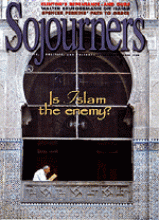Advent stretches over the four Sundays before Christmas, but in 1998 I began thinking Advent thoughts in late summer. Perhaps it was the presence of economists everywhere commenting on the financial collapses in Asia and Russia and giving their oracles of doom and deliverance for the rest of the world. Perhaps it was the day that the newspaper Metro section had no less than three reports of sexually abused children (including a case where a mother "rented" her daughter to a child molester to fund her drug habit).
Whatever the immediate cause, I began to long for tidings of great joy; I began to think about hope and dread and security and deliverance. I began to think about waiting, and what it is, really, that any of us wait for.
These are Advent thoughts, for Advent is marked by tensiontension between uncertainty and hope, fear and longing, the now and not-yet of God's promises. It is a time of penitential preparation for the birth of Christ. It is a dangerous time for the faithful, because it calls us to examine the end and the beginning of our faith.
Fittingly, the lectionary passages for this season are as much about judgment as about reassurance. Christmas may inevitably bring sentimental soft-focus scenes of mother and infant, but the scriptures for Advent make clear that such a scene is merely the eye of a hurricane. It is a mistake to think that just because God comes as a helpless child the effects of incarnation will be small and manageable, contained. During Advent, the words of the prophetsfrom Isaiah to John the Baptistare foretelling change, potentially cataclysmic, at all levels: personal, political, cosmic. Why do we think that God being with us will make the ride less wild?
Read the Full Article
